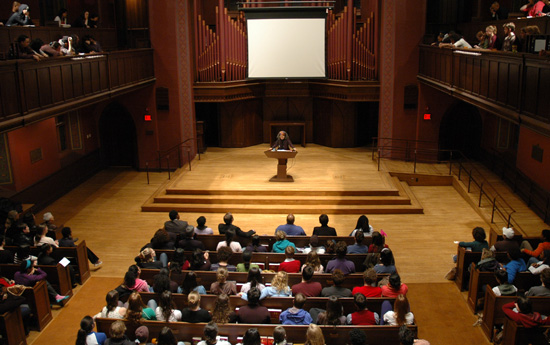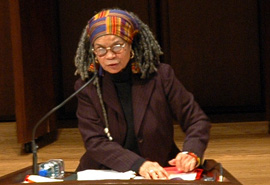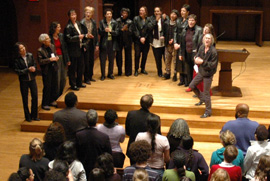Poet Delivers Keynote Address at Martin Luther King Jr. Celebration
 |
| Civil rights activist Sonia Sanchez speaks during Wesleyans Celebration of the Life of Martin Luther King Jr. event Jan. 30 in Memorial Chapel. |
| Posted 02/01/07 |
 Poet, author and civil rights activist Sonia Sanchez delivered the keynote address during Wesleyans Celebration of the Life of Martin Luther King Jr. event Jan. 30. She met King in 1957 and shared excerpts of Kings speeches with an over-flowing audience in Memorial Chapel. Poet, author and civil rights activist Sonia Sanchez delivered the keynote address during Wesleyans Celebration of the Life of Martin Luther King Jr. event Jan. 30. She met King in 1957 and shared excerpts of Kings speeches with an over-flowing audience in Memorial Chapel.
Often in poetic rhythm, Sanchez spoke about her own life and the troubles she and her family faced as being poor, black Americans. She emphasized her years in New York City, and explained her struggle for identity. She talked about her involvement in the Civil Rights movement. She shared her opinions on war and offered advice to the students. My brothers, my sisters. This is your century. Demand that this world moves forward in peace, she said. This is your country. This is your time. Learn what it means to walk upright as a human being in the 21st century. What does it mean to be human? You got to ask yourself that question.  In addition to Sanchezs talk, Ruby-Beth Buitekant 09 and Melanye Price, assistant professor of government, offered a reflection; The Roadside Girls (pictured at right) and Ebony Singers provided song, and Kevin Butler, associate dean of Student Services, welcomed the audience. In addition to Sanchezs talk, Ruby-Beth Buitekant 09 and Melanye Price, assistant professor of government, offered a reflection; The Roadside Girls (pictured at right) and Ebony Singers provided song, and Kevin Butler, associate dean of Student Services, welcomed the audience.
Following an excerpt from Martin Luther King Jr.s Wesleyan Baccalaureate Address June 7, 1964, President Doug Bennet delivered remarks on King Jr.s history with Wesleyan. To chronicle Kings visits, Bennet and staff consulted with several people who were part of the King era at Wesleyan and wanted to share their memories. Bennet thanked John Maguire, formerly a professor of religion at Wesleyan and president emeritus of the Claremont Graduate Schools; Willard McRae, an administrator at Middlesex Memorial Hospital, frequent adviser, and guide to Wesleyan students volunteering in Middletown; and Rick Tuttle, 62 who was a civil rights volunteer in Mississippi and Georgia in the summer of 1963. The Wesleyan connection with King began when John Maguire joined the Religion Department at Wesleyan in 1960. As an 18-year-old student in Virginia, Maguire had by chance met and become a close friend of the then-21-year-old Martin Luther King Jr. who was studying at Crozer Theological Seminary in Pennsylvania. During the late 1950s, King had begun coming to New England to speak and raise money for the civil rights movement. When he arrived at Bradley airport, Maguire, who was by then studying at Yale, would pick him up and drive him to his speaking engagements. These werent Kings first visits to Connecticut. When he was 16, after his first year at Morehouse College, he spent a summer working in the tobacco fields near Hartford. He came north for the good pay and the chance to observe race relations in New England. King later reflected that he was elated to find that he could sit anywhere in a restaurant and order food. In May, 1961, Maguire and his department chair, David Swift, joined the Freedom Riders. They were jailed briefly in Montgomery, and later met with King. Maguire invited King to preach at Wesleyan, and arranged it so that Kings first visit to campus. On Jan. 14, 1962, King preached to an overflowing chapel. He stayed overnight at the university guesthouse on High Street in order to be available most of the next day to the College of Social Studies students and faculty. In February of 1963, King preached at Yales Battell Chapel in the morning, got a ride from Maguire to his house at 44 Home Avenue, took a brief a nap, then preached again that evening in the Wesleyan chapel. Early in 1964 President Victor Butterfield asked Professor Maguire to see if King would be willing to be Wesleyans end-of-school Baccalaureate preacher and to receive the universitys honorary doctorate degree. King agreed, but said that he had to make it tentative since he was not always sure of his schedule. Then, on the Monday before he was to arrive for the weekend ceremonies, King went to jail challenging segregation in St. Augustine, Fla. Maguire and Kings chief aide, Andrew Young persuaded King to post bail on Saturday afternoon and fly to Bradley, arriving early Sunday morning. Following his baccalaureate address, Maguire presented King with his degree and they stood while the crowd gave King a long, standing ovation. As they made their way from the platform back to North College, there was continuous applause. On Monday, King flew back to St. Augustine and reentered jail for another few days. In 1966, King paid his last visit to Wesleyan, again to preach at McConaughy Hall. The audience overflowed. The Wesleyan Board of Trustees was meeting on the weekend following Kings death in 1968. President Ted Etherington asked the meeting to adjourn early the morning after the assassination and move to the Chapel where he asked John Maguire to provide an informal eulogy for King. The Wesleyan community has continued its commitment to civil rights and justice, Bennet said. Poet Sonia Sanchez keynote embodies that tradition. The Martin Luther King, Jr. commemoration received funding from the Office of the Dean of the College, the President’s Office, and the Office of Affirmative Action, with planning and support from a committee of staff, students and faculty. |
| By Olivia Drake, The Wesleyan Connection editor and Elan Barnehama, university writer |

